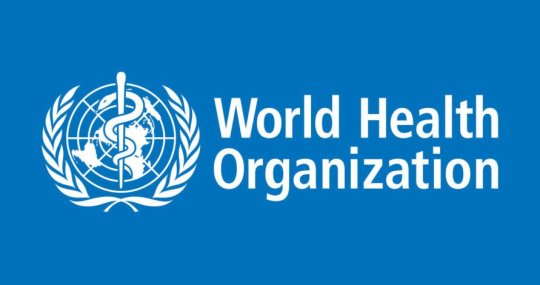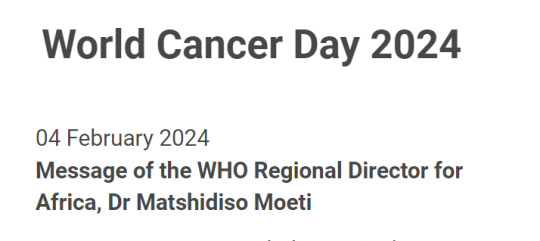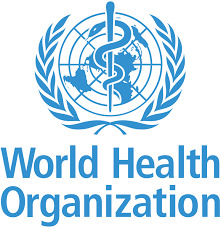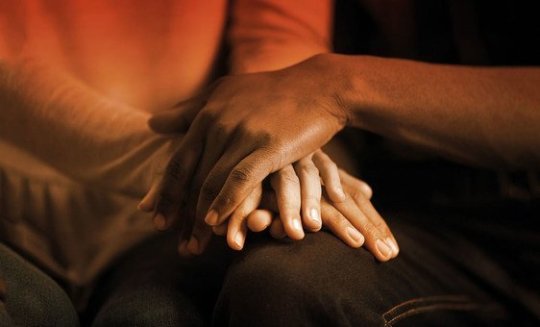#Matshidiso Moeti
Text
2.5 million Africans contracted TB in 2022 - WHO
The Regional Director for Africa, World Health Organisation, Dr. Matshidiso Moeti, said about 2.5 million individuals contracted Tuberculosis in 2022 in Africa, equating to one person every 13 seconds.
Moeti also said the number of TB deaths in 2022 reached 424,000, resulting in the loss of one life every minute – even when TB is preventable and treatable.
She said this in her message to…
View On WordPress
0 notes
Text
After the coronavirus pandemic and the rise of monkeypox cases, news of another virus can trigger nerves globally. The highly infectious Marburg virus has been reported in the West African country of Ghana this week, according to the World Health Organization.
Two unrelated people died after testing positive for Marburg in the southern Ashanti region of the country, the WHO said Sunday, confirming lab results from Ghana’s health service. The highly infectious disease is similar to Ebola and has no vaccine.
Health officials in the country say they are working to isolate close contacts and mitigate the spread of the virus, and the WHO is marshaling resources and sending specialists to the country.
“Health authorities have responded swiftly, getting a head start preparing for a possible outbreak. This is good because without immediate and decisive action, Marburg can easily get out of hand,” said the WHO’s regional director for Africa, Matshidiso Moeti.
Fatality rates from the disease can reach nearly 90 percent, according to the WHO.
Here’s what we know about the virus:
What is the Marburg virus?
Marburg is a rare but highly infectious viral hemorrhagic fever and is in the same family as Ebola, a better-known virus that has plagued West Africa for years.
The Marburg virus is a “genetically unique zoonotic … RNA virus of the filovirus family,” according to the Centers for Disease Control and Prevention. “The six species of Ebola virus are the only other known members of the filovirus family.”
Fatality rates range from 24 percent to 88 percent, according to the WHO, depending on the virus strain and quality of case management.
Marburg has probably been transmitted to people from African fruit bats as a result of prolonged exposure from people working in mines and caves that have Rousettus bat colonies. It is not an airborne disease.
Once someone is infected, the virus can spread easily between humans through direct contact with the bodily fluids of infected people such as blood, saliva or urine, as well as on surfaces and materials. Relatives and health workers remain most vulnerable alongside patients, and bodies can remain contagious at burial.
The first cases of the virus were identified in Europe in 1967. Two large outbreaks in Marburg and Frankfurt in Germany, and in Belgrade, Serbia, led to the initial recognition of the disease. At least seven deaths were reported in that outbreak, with the first people infected having been exposed to Ugandan imported African green monkeys or their tissue while conducting lab research, the CDC said. Nearly 800,000 doses of monkeypox vaccine may be in U.S. by end of July
Where has Marburg been detected?
The Ghana cases are only the second time Marburg has been detected in West Africa. The first reported case in the region was in Guinea last year. The virus can spread quickly. More than 90 contacts, including health workers and community members, are being monitored in Ghana. The WHO said it has also reached out to neighboring high-risk countries to put them on alert.
Cases of Marburg have previously been reported elsewhere in Africa, including in Uganda, the Democratic Republic of Congo, Kenya, South Africa and Zimbabwe. The largest outbreak killed more than 200 people in Angola in 2005.
The virus is not known to be native to other continents, such as North America, and the CDC says cases outside Africa are “infrequent.” In 2008, however, a Dutch woman died of Marburg disease after visiting Uganda. An American tourist also contracted the disease after a Uganda trip in 2008 but recovered. Both travelers had visited a well-known cave inhabited by fruit bats in a national park.
What are the symptoms?
The illness begins “abruptly,” according to the WHO, with a high fever, severe headache and malaise. Muscle aches and cramping pains are also common features.
In Ghana, the two unrelated individuals who died experienced symptoms such as diarrhea, fever, nausea and vomiting. One case was a 26-year-old man who checked into a hospital on June 26 and died a day later. The second was a 51-year-old man who went to a hospital on June 28 and died the same day, the WHO said.
In fatal cases, death usually occurs between eight and nine days after onset of the disease and is preceded by severe blood loss and hemorrhaging, and multi-organ dysfunction.
The CDC has also noted that around day five, a non-itchy rash on the chest, back or stomach may occur. Clinical diagnosis of Marburg “can be difficult,” it says, with many of the symptoms similar to other infectious diseases such as malaria or typhoid fever.
Can Marburg be treated?
There are no vaccines or antiviral treatments approved to treat the Marburg virus.
However, supportive care can improve survival rates such as rehydration with oral or intravenous fluids, maintaining oxygen levels, using drug therapies and treating specific symptoms as they arise. Some health experts say drugs similar to those used for Ebola could be effective.
Some “experimental treatments” for Marburg have been tested in animals but have never been tried in humans, the CDC said.
Virus samples collected from patients to study are an “extreme biohazard risk,” the WHO says, and laboratory testing should be conducted under “maximum biological containment conditions.” WHO warns covid ‘nowhere near over’ as variants spike in U.S., Europe
Anything else to know?
The WHO said this week it is supporting a “joint national investigative team” in Ghana and deploying its own experts to the country. It is also sending personal protective equipment, bolstering disease surveillance and tracing contacts in response to the handful of cases.
More details are likely to be shared at a WHO Africa online briefing scheduled for Thursday.
“It is a worry that the geographical range of this viral infection appears to have spread. This is a very serious infection with a high mortality rate,” international public health expert and professor Jimmy Whitworth of the London School of Hygiene and Tropical Medicine told The Washington Post on Monday.
“It is important to try to understand how the virus got into the human population to cause this outbreak and to stop any further cases. At present, the risk of spread of the outbreak outside of Ashanti region of Ghana is very low,” he added.
3 notes
·
View notes
Text
📰 Up to 65 percent of Africans have had COVID-19, far more than thought, WHO says 🗞️ The Associated Press
JOHANNESBURG (AP) — The World Health Organization (WHO) said that up to 65 percent of people in Africa have been infected with the coronavirus and estimates the number of actual cases may have been nearly 100 times more cases than those reported.
In a new analysis released Thursday, the U.N. health agency reviewed 151 studies of COVID-19 in Africa based on blood samples taken from people on the continent between January 2020 and December 2021. WHO said that by last September, about 65 percent of people tested had some exposure to COVID-19, translating into about 800 million infections. In contrast, only about 8 million cases had been officially reported to WHO during that time period.
“This undercounting is occurring worldwide and it’s no surprise that the numbers are particularly large in Africa where there are so many cases with no symptoms,” WHO’s Africa director Matshidiso Moeti said in a statement. WHO’s analysis found that a large proportion of people with COVID-19 — 67 percent — showed no symptoms when infected with the disease, a higher percentage than other world regions.
0 notes
Text
Cancer: 1 Million Annual Deaths Likely In Africa By 2030 – WHO
The World Health Organization (WHO) says cancer mortality in Africa could reach about one million deaths per year by 2030 if urgent measures are not taken.
WHO Regional Director for Africa, Dr Matshidiso Moeti stated this in a statement to mark this year’s World Cancer Day.
She said 573 653 deaths from cancer occurred in the African region in 2022, adding that approximately 882 new cancer…

View On WordPress
0 notes
Text
Message of the WHO Regional Director for Africa, Dr Matshidiso Moeti.

In August 2023, I attended a cervical cancer meeting with survivors and was excited by the potential of new tools to accelerate access to vaccination, screening, and treatment. One of the things survivors said was the need for leaders to listen to their stories.
On the 4th of February every year, the world unites to raise awareness on fundamental cancer issues; we at the WHO African Region connect with the public in spearheading this annual awareness day and beyond.
Between 2022 and 2024, the focus of World Cancer Day is to help “Close the cancer gap.” This year marks the third and final year of the campaign. The theme for this year is “Together, we challenge those in power”. This theme encompasses the global demand for leaders to prioritize and invest in cancer prevention and care and to do more to achieve a just and cancer-free world.
The cancer situation in Africa is disheartening. In the year 2020, approximately 1.1 million new cancer cases occurred on the continent, with around 700 000 deaths. About 50% of new cancer cases in adults in Africa are due to breast, cervical, prostate, colorectal, and liver cancers. If urgent measures are not taken, cancer mortality in the region is projected to reach about one million deaths per year by 2030. Also, in 20 years, cancer death rates in Africa will overtake the global average of 30%. This is more so because cancer survival rates in the WHO African region currently average 12%, much lower than the average of over 80% in High-Income Countries.
Nevertheless, we commend the progress made in cancer prevention and care in our region. For instance, 17 countries have introduced high-performance-based screening tests in line with the WHO recommendations. Also, 28 of our Member States have introduced nationwide HPV vaccination to reach about 60% of the priority population targeted with HPV vaccination.
This year’s theme is auspicious as it reinforces all persons and groups’ universal right to health. We believe that regardless of socioeconomic status, geographic location, age, and gender, every person must be afforded an equal chance at the prevention, diagnosis, and treatment of cancer.
We call on the region’s countries, communities, partners, and civil society to unite and foster universal access to cancer prevention and care.
Stakeholders must identify feasible priorities, implement evidence-based population-wide interventions and invest in cancer control.
Countries should use the updated WHO Best Buys , the facilitative tool designed to enable governments to select lifesaving policies and interventions for noncommunicable diseases.
Leaders are responsible for ensuring that cancer prevention and care deploy technologies and therapies that are available at low cost to affected persons and their families, which are value for money. Furthermore, countries should strengthen information systems to gather quality data for decision-making.
We reiterate that civil society, especially organizations of cancer survivors or persons with lived cancer experiences, are critical in the fight against cancer in Africa. Such a whole-of-society approach to cancer prevention and care is the essence of this year’s World Cancer Day theme.
“Together, we challenge those in power” to go the extra mile for a cancer-free Africa!
Learn more:
Cancer Today (iarc.fr)
WHO report on cancer: setting priorities, investing wisely and providing care for all
Noncommunicable Disease Surveillance, Monitoring and Reporting (who.int)
New recommendations for screening and treatment to prevent cervical cancer (who.int)
Cervical cancer | WHO | Regional Office for Africa
Three African countries pilot initiative to boost cervical and breast cancer care | WHO | Regional Office for Africa
Beating childhood cancer | WHO | Regional Office for Africa
The Global Initiative for Childhood Cancer (who.int)
Cervical Cancer Elimination Initiative
The Global Breast Cancer Initiative (who.int)
WHO and St. Jude to dramatically increase global access to childhood cancer medicines
0 notes
Text
With the certification, Cabo Verde – also known as Cape Verde – joined the ranks of 43 countries and one territory which have eliminated the disease. It is the third African nation to join the list, along with Mauritius and Algeria, which were declared malaria free in 1973 and 2019, respectively.
Malaria burden is the highest on the African continent, which in 2021 accounted for approximately 95 per cent of global malaria cases and 96 per cent of related deaths.
“Cabo Verde's success is the latest in the global fight against malaria, and gives us hope that with existing tools, as well as new ones including vaccines, we can dare to dream of a malaria-free world,” Mr. Tedros said.
Echoing those words, Matshidiso Moeti, WHO Director for Africa, said it was an inspiring example for other nations to follow.
“Cabo Verde’s achievement is a beacon of hope for the African Region and beyond. It demonstrates that with strong political will, effective policies, community engagement and multisectoral collaboration, malaria elimination is an achievable goal,” she said.
0 notes
Text
WHO URGED MEMBER STATES TO SCALE UP TRADITIONAL MEDICINES TO MEET THE NEEDS OF 80% OF PEOPLE IN DIRE NEEDS
By Vincess Okushi
The World Health Organization (WHO) has called on Member States to scale up their efforts to the implementation of evidence-based Traditional Medicine (TM) to achieve the health-related Sustainable Development Goals to promote health and well-being for all Africans.
WHO Regional Director for Africa, Dr Matshidiso MOETI made the call in a message to mark this…

View On WordPress
0 notes
Link
#Africanhealthministers#Africanregion'shealthinitiativesagainstresistance#Antimicrobialresistancestrategy#Challengesandimpactofresistance#Combatinghealthcrisisthroughstrategy#Globalconcern:antimicrobialresistance#Healthministers'unitedstrategy#Publichealthcrisisaddressedstrategically#Regionaleffortsagainstresistance#Sub-SaharanAfrica'sresistancechallenges
0 notes
Text
For more than a hundred days in Sudan, fighting has raged between the army, led by General Abdel Fattah Abdelrahman Al-Bourhane, and the paramilitaries of the Rapid Support Forces (FSR), General Mohammed Hamdan Daglo, known as “Hemetti”. On Tuesday July 25, air raids and artillery fire again hit the capital, Karthoum, the epicenter of the violence; at least sixteen civilians died, a citizens’ group said.
“Sixteen citizens died today in this senseless war”, killed by gunfire that hit houses in the Ombada district, in the northwest of the capital, according to the resistance committee of this district. This is one of the groups of citizen defenders of democracy who have formed to organize mutual aid among the population.
Mohamed Mansour, a resident of Ombada, told Agence France-Presse that he had “helped get eight bodies out” rubble of a house. “Four people, including two children, were killed in the neighboring house”according to Hagar Youssef, another resident.
Read also: Article reserved for our subscribersIn Sudan, mediations fail and the fear of regionalization of the conflict increases
In three months, more than 3,900 dead and 3.3 million displaced
Since the outbreak of the conflict on April 15, 3,900 people have died according to a report by the NGO Armed Conflict Location & Event Data Project (Acled), and 3.3 million inhabitants have taken refuge in the country or abroad, according to the UN.
Most of the fighting is concentrated in densely populated areas of the capital. On Tuesday, residents reported an RSF attack on the army ammunition depot in the south of the city.
Democracy lawyers also claimed on Monday that civilians living in central and southern Khartoum were “forced out of their homes” to make way for fighters.
Read also: War in Sudan: residents appeal for donations to survive
Millions of Sudanese also face shortages of water, food and electricity, in scorching heat, locked in their homes trying to protect themselves from the shootings.
More than half of the population needs humanitarian aid
On Tuesday, the World Health Organization (WHO) expressed alarm at “the catastrophic humanitarian crisis” what the country knows, “where more than 67% of hospitals are out of service”. Health services and humanitarian aid stocks have often been the target of attacks and looting.
According to the UN, more than half of the 48 million Sudanese now need humanitarian aid to survive.
The WHO also renewed on Tuesday its call for help to fight epidemics, in particular cholera and malaria, which are common during the rainy season, which began in June. “Epidemics are likely to cause more deaths if urgent measures are not taken to stop their spread”alerted Ahmed Al-Mandhari and Matshidiso Moeti, WHO regional directors for the Eastern Mediterranean and Africa.
0 notes
Text
Polio Outbreak Due To Vaccine In East Africa
Health officials in Burundi have declared an outbreak of polio linked to the vaccine, the first time the paralytic disease has been detected in the East African country for more than three decades.
Polio has been diagnosed in an unvaccinated four-year-old child in the western part of the country and in two other children who were contacts of the child, authorities in Burundi confirmed in a statement on Friday. Officials also found traces of the virus in sewage samples, confirming the circulation of polio.
The virus that sickened the children was found to be a mutated strain of polio that initially came from an oral vaccine.
The Burundi government declared the polio outbreak to be a national public health emergency and plans to start an immunization campaign within weeks, aimed at protecting all children up to age seven.
“We are supporting the national efforts to ramp up polio vaccination to ensure no child is missed and faces polio’s debilitating impact,” said Dr. Matshidiso Moeti, WHO’s Africa director.
0 notes
Text
WHO Africa addresses International Women’s Day 2023
Message of WHO Regional Director for Africa, Dr Matshidiso Moeti
Dear colleagues and partners,
I am delighted to celebrate this year’s International Women’s Day with you in recognition of women and girls championing the advancement of transformative digital technology.
This year’s theme, “DigitALL: Innovation and technology for gender equality,” highlights the role of innovative technology in…

View On WordPress
0 notes
Text
WHO confirms 135 million Africans have ear, hearing problems

The World Health Organisation (WHO), says about 135 million people in Africa have ear and hearing problems.
Dr Matshidiso Moeti, the WHO Regional Director for Africa, in a statement to mark this year’s World Hearing Day, said, “At the current rate, it is likely that by 2050 there could be over 338 million people affected by ear and hearing issues in Africa.”
With the theme of this year’s commemoration, Ear and hearing care for all, Moeti said, ”let’s make it a reality so that inequalities disproportionately impact marginalized populations as the burden of ear and hearing problems reflect significantly.
According to her, nearly 80 per cent live in low-and middle-income countries with over 1.5 billion people living with ear problems and hearing loss.
She lamented that the problems of ear and hearing difficulty have greatly impacted the lives of those affected, their families, and their communities, alleging that they do not know how and where to find help or do not have access to the needed services.
She observed that there was a need for government to prioritise ear and hearing care as part of their non-communicable diseases and universal health care agenda and increase their campaign, and political and financial commitment with a view to curbing the problems associated with the disease.
Read the full article
0 notes
Text
JOHANNESBURG (AP) — Health authorities in Mozambique declared a polio outbreak Wednesday after confirming that a child in the country’s northeastern Tete province had been paralyzed by the disease.
The case in Mozambique is the second imported case of polio in southern Africa this year, following a case discovered in Malawi in mid-February. It's the first case of wild polio in Mozambique since 1992, although cases linked to a mutated virus from the oral vaccine were detected in 2019.
The latest case in Mozambique was found in a child who experienced signs of paralysis in late March, according to a statement issued by the World Health Organization.
Sequencing indicates that the case in Mozambique is linked to a strain of polio spreading in Pakistan in 2019, similar to the case reported in Malawi earlier this year.
WHO declared Africa free of the wild polio virus in August 2020 even though numerous countries across the continent have reported outbreaks linked to the vaccine in recent years. There is no difference between the disease caused by the wild virus or the mutated virus from the vaccine.
“The detection of another case of wild poliovirus in Africa is greatly concerning, even if it’s unsurprising given the recent outbreak in Malawi. However, it shows how dangerous this virus is and how quickly it can spread,” said Matshidiso Moeti, the World Health Organization's Africa director.
In response to the case in neighboring Malawi, Mozambique recently carried out two mass vaccination campaigns in which 4.2 million children were vaccinated against the disease, said WHO.
Disease surveillance is being strengthened in five countries: Malawi, Mozambique, Tanzania, Zambia and Zimbabwe. Vaccination campaigns in the coming weeks are planned to reach 23 million children aged five years and below.
Polio is highly infectious, spread mostly via water and largely affects children younger than five years. There is no cure for polio, and it can only be prevented by immunization. WHO and its partners began an effort to eradicate polio globally in 1988 and have missed numerous deadlines to wipe out the disease.
1 note
·
View note
Text
Ebola outbreak in Uganda adds 25 deaths in a month
Ebola outbreak in Uganda adds 25 deaths in a month
Ugandan Health Minister Jane Ruth Aceng Ocero – UGANDA MINISTRY OF HEALTH
The World Health Organization (WHO) has reported this Thursday that the Ebola outbreak that was declared on September 20 in Uganda already accumulates 64 cases and 25 confirmed deaths from the virus.
The regional director for Africa of the WHO, Matshidiso Moeti, has communicated the balance of victims, one month after the…
View On WordPress
0 notes
Text
More than 116m people living with mental health conditions in Africa – WHO
More than 116m people living with mental health conditions in Africa – WHO
By Aluta News
Oct. 10, 2022
The World Health Organisation (WHO) has said that more than 116 million people are estimated to be living with mental health conditions in Africa.
Dr Matshidiso Moeti WHO Regional Director for Africa said this in Abuja in a message to mark the 2022 World Mental Health Day which has the theme, “Make Mental Health and Wellbeing for All a Global Priority”.
According to…

View On WordPress
0 notes
Text
Make suicide prevention in Africa a priority, UN health agency urges governments |
Make suicide prevention in Africa a priority, UN health agency urges governments |
“Every death by suicide is a tragedy,” said Dr. Matshidiso Moeti, WHO Regional Director for Africa, who maintained the suicide prevention was “rarely a priority” in national health programmes.
Ahead of World Mental Health Day on 10 October, she called for “significant investment…to tackle Africa’s growing burden of chronic diseases and non-infectious conditions – such as mental disorders – that…

View On WordPress
0 notes